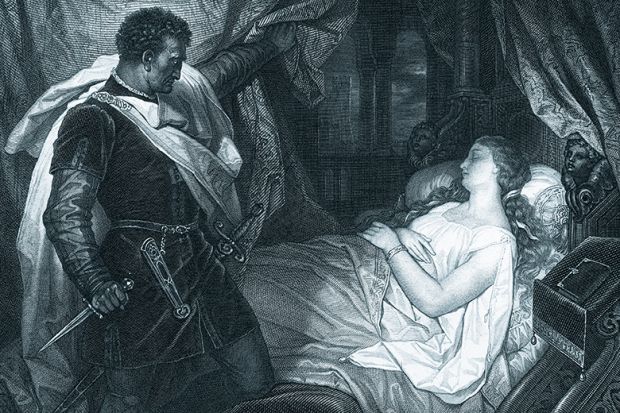In her 1982 lecture “Writing the Male Character”, Margaret Atwood recalled asking a male friend why men were afraid of women. “They’re afraid women will laugh at them” came the reply. Atwood then asked “some women students” why women were afraid of men. “They’re afraid of being killed,” they answered.
This lethal discrepancy is in effect the central motif in Loraine Fletcher’s book. “Shakespeare’s men accuse women of deception because they’re humiliated or irrationally jealous,” she writes, “and because that’s what their culture has conditioned them to do.” In return, Shakespeare’s women repeatedly suffer the most egregious cruelty, both literally and metaphorically, at the hands of fathers, lovers, husbands and sons.
“Attempted or successful honour killings form the plots of a surprising number of Shakespeare’s plays,” claims Fletcher, before continuing: “Am I just giving well-known episodes a modern label without saying anything new? I don’t think so.” It’s a courageous writer who plants this kind of hostage to fortune squarely in a book’s opening lines. Unfortunately, here as elsewhere, I disagree with her: the work fails successfully to advance an original hypothesis about early modern misogyny.
Part of the problem lies in the book’s uneasy identity: it’s neither “academic” (I found its scant critical apparatus immensely frustrating – the bibliography is only three pages long, for example), nor “mass market”. Fletcher is clearly writing for an educated but non-specialist reader – and that’s a good thing. However, the desire to be “relevant” leads to odd juxtapositions and examples. We’re told that “On average in the UK, two women a week are killed out of jealousy by would-be lovers or by their former partners or husbands”, but we’re given neither reference to a source nor indication of avenues of help. Honour Killing in Shakespeare is not rigorous enough to be scholarly, and not activist enough to be political. Like Caliban, it eschews easy categorisation.
Some of the claims Fletcher makes are just inane, and some of the writing is infelicitous. Thus we’re told that Elizabeth I’s ginger hair is “the Plantagenet DNA on her head”, and, in an absurd analogy that almost straight away collapses in on itself, that “Henry VIII was our own little Hitler, his state murders of ‘heretics’ as crazy though of course nothing near as widespread as Hitler’s racial murders”.
More serious, however, are the book’s unreferenced and unsubstantiated claims. In A Winter’s Tale, when Antigonus, in order to stress his unshakeable belief in Hermione’s innocence, says he’ll “geld” his three daughters should she be proven to be unfaithful, it is surely not the case that he “is talking about female genital mutilation, or excision of the clitoris”. Fletcher further extrapolates from this conjecture to claim that FGM was “probably something travellers reported on their return from parts of the world where it was endemic”. With no reference to any sources whatsoever, that “probably” becomes preposterously insubstantial.
Finally, Fletcher asserts that the book “comes from a lifetime’s reading, seeing and teaching Shakespeare”, and I have no reason to doubt this. In her conclusion, she reflects on how a “major regret” for her “is the divergence of academic and non-academic but educated language. They’ve parted company.” She’s right, of course, but they would at the very least need a temporary reconciliation for this book to work.
Emma Rees is professor of literature and gender studies at the University of Chester, where she is director of the Institute of Gender Studies.
Honour Killing in Shakespeare
By Loraine Fletcher
Greenwich Exchange
350pp, £19.99
ISBN 9781910996263
Published 1 June 2019
Right of reply: The author responds:
Much of Emma Rees’ recent review of my book is about matters of tone and categorisation. She makes only one point about my readings of the plays, so I’ll reply mainly to that, although it involves just a small section of my book.
Discussing The Winter’s Tale, I quote a speech by a courtier of King Leontes and Queen Hermione, Antigonus, who doesn’t at first believe that Hermione is guilty of the adultery her husband means to burn her for. Antigonus says (2.1.144-51):
Be she [Hermione] honour-flawed [guilty of adultery], –
I have three daughters: the eldest is eleven,
The second and the third, nine and some five.
If this [the charge of adultery] prove true, they’ll pay for it. By mine honour,
I’ll geld them all; fourteen they shall not see,
To bring false generations [illegitimate children]; they are co-heirs;
And I had rather glib [castrate] myself than they
Should not produce fair issue [legitimate children].
This speech is clearly about female genital mutilation, which Antigonus means to inflict on his three girls if it ever emerges that Hermione is guilty. If she is, any woman could be. I discuss the property aspects of FGM: Antigonus has no son, and wants his estate to pass eventually to legitimate grandchildren. The safest way to achieve this, he thinks, would be by ensuring his daughters never have sex voluntarily (they’ll have no choice about having sex with their husbands, who’ll be chosen by Antigonus).
Later, in a far-off country where he’s been ordered to expose Hermione’s baby daughter to be eaten by wild animals, he comes (very easily) to believe Hermione is guilty. Logically, then, he should go home and arrange for the genital mutilation of his daughters. But Apollo destroys his ship, and Nature, by now enraged, sends in that well-known bear. Both Civilisation and Nature condemn burning women, throwing away girl babies, FGM and the misogyny that leads to these horrors.
All this is new and might, I think, be interesting to some readers. Rees dismisses it as among my “inane” claims, my “desire to be relevant”. She says “it is surely not the case” that the speech is about FGM, but gives no reason for her opinion. I suggest she reads the speech. Once she’s done that, I invite her to explain what then she does think it’s about. Times Higher Education readers might like to offer their own opinions.
Rees seems to like categories. She complains that my book is not academic, mass market or politically activist, and she’s right, at least on her own understanding of these terms. My bibliography runs to only three pages because it includes only books named in or directly feeding into my own. I don’t download the Shakespeare section of the British Library catalogue in the hope of persuading my readers that I’ve read the lot. I don’t reference statements like “on average in the UK, two women a week are killed out of jealousy by would-be lovers or by their former partners or husbands”. Some things are too well known to need referencing.
Honour Killing in Shakespeare is not scholarly but critical, a close reading of the verse, something apparently outside Rees’ experience and little to her taste. I question exegesis through contextual social history, the “what they thought/did in those days” approach, as a means of understanding Shakespeare. When he alludes to FGM, I consider the bearing of that on other episodes in the play. I don’t find it necessary to embark on a global history of FGM.
With a rare touch of wit, Rees concludes that “Like Caliban, [the book] eschews easy categorisation.” I’ll take that as a compliment, while awaiting her own explanation of Antigonus’ speech.
Loraine Fletcher
University of Reading (retired)
Register to continue
Why register?
- Registration is free and only takes a moment
- Once registered, you can read 3 articles a month
- Sign up for our newsletter
Subscribe
Or subscribe for unlimited access to:
- Unlimited access to news, views, insights & reviews
- Digital editions
- Digital access to THE’s university and college rankings analysis
Already registered or a current subscriber? Login








